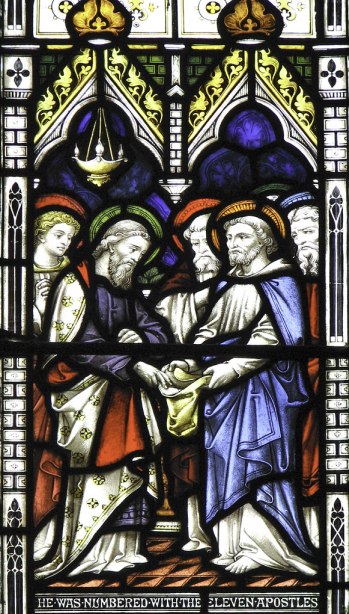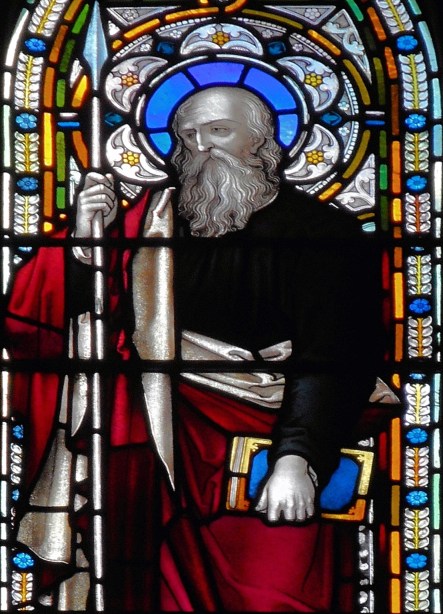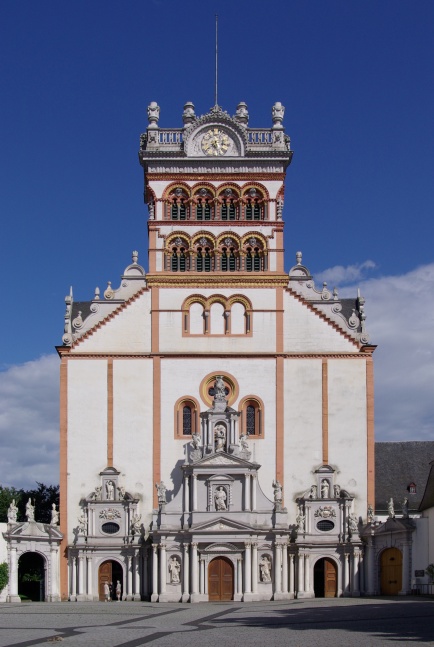The Traditional Catholic Liturgy
Adapted from The Liturgical Year by Dom Prosper Guéranger OSB.
Feast of St. Matthias, Apostle – February 24 (or 25 in leap years)
 An Apostle of Jesus Christ, St. Matthias is one of the Blessed choir, which Holy Mother Church would have us honor during the
Season of Septuagesima or early Lent. St. Matthias was one of the first to follow our Savior, and he was an eye-witness of all His divine
actions up to the very day of the Ascension. He was one of the seventy-two Disciples, but Our Lord had not conferred upon him the dignity
of an Apostle. And yet, he was to have this glory, for it was of him that David spoke, when he prophesied that another should take the
Bishopric (Ps. 108: 8; Acts 1: 16) left vacant by the apostasy of Judas the traitor. In the interval between Jesus' Ascension and the
Descent of the Holy Ghost, the Apostolic College had to complete the mystic number fixed by Our Lord Himself so that there might be the
Twelve on that solemn day, when the Church, filled with the Holy Ghost, was to manifest Herself to the synagogue.
An Apostle of Jesus Christ, St. Matthias is one of the Blessed choir, which Holy Mother Church would have us honor during the
Season of Septuagesima or early Lent. St. Matthias was one of the first to follow our Savior, and he was an eye-witness of all His divine
actions up to the very day of the Ascension. He was one of the seventy-two Disciples, but Our Lord had not conferred upon him the dignity
of an Apostle. And yet, he was to have this glory, for it was of him that David spoke, when he prophesied that another should take the
Bishopric (Ps. 108: 8; Acts 1: 16) left vacant by the apostasy of Judas the traitor. In the interval between Jesus' Ascension and the
Descent of the Holy Ghost, the Apostolic College had to complete the mystic number fixed by Our Lord Himself so that there might be the
Twelve on that solemn day, when the Church, filled with the Holy Ghost, was to manifest Herself to the synagogue.
St. Peter having, in a general assembly of the faithful held shortly after the Ascension, declared from Holy Scripture the
necessity of choosing a twelfth Apostle, in the place of Judas; two were unanimously pitched upon by the assembly, as most worthy of the
dignity – Joseph, called Barsabas and, on account of his extraordinary piety, surnamed the Just, and Matthias. After devout prayer to God,
that He would direct them in their choice, they proceeded by way of lot. The lot fell on Matthias (Acts 1). He was accordingly
associated with the eleven, and ranked among the Apostles. When in deliberations each side appears equally good, or each candidate of
equally approved merit, lots may sometimes be lawfully used; otherwise, to commit a thing of importance to such a chance, or to expect
a miraculous direction of divine providence in it, would be a criminal superstition and a tempting of God,
except when He Himself,
by any evident revelation or inspiration, appoints such a means for the manifestation of His will, promising His supernatural interposition
in it, which was the case on this extraordinary occasion. The miraculous dreams or lots, which we read of in the prophets, must in no ways
be used to authorize any rash, superstitious use of such means in others who have not the like authority.
 We justly admire the virtue of this holy assembly of saints. Here were no solicitations or intrigues. No one promoted himself
for the dignity. Ambition can find no place in a virtuous or humble heart. He who seeks a dignity either knows himself to be unqualified,
and is on this account guilty of the most flagrant injustice with regard to the public, by desiring a charge to which he is in no way equal;
or he thinks himself qualified for it, and this self-conceit and confidence in his abilities renders him the most unworthy of all the others.
Such a disposition deprives the soul of divine assistance, without which we can do nothing; for God withdraws His grace and refuses His blessing
where self-sufficiency and pride have found any footing. It is something of a secret confidence in ourselves, and a presumption that we deserve
the divine assistance, which banishes Him from us. This is true even in our temporal undertakings; but much more so in the charge of souls,
in which all success is more particularly the work of the Holy Ghost, not the fruit of human industry.
We justly admire the virtue of this holy assembly of saints. Here were no solicitations or intrigues. No one promoted himself
for the dignity. Ambition can find no place in a virtuous or humble heart. He who seeks a dignity either knows himself to be unqualified,
and is on this account guilty of the most flagrant injustice with regard to the public, by desiring a charge to which he is in no way equal;
or he thinks himself qualified for it, and this self-conceit and confidence in his abilities renders him the most unworthy of all the others.
Such a disposition deprives the soul of divine assistance, without which we can do nothing; for God withdraws His grace and refuses His blessing
where self-sufficiency and pride have found any footing. It is something of a secret confidence in ourselves, and a presumption that we deserve
the divine assistance, which banishes Him from us. This is true even in our temporal undertakings; but much more so in the charge of souls,
in which all success is more particularly the work of the Holy Ghost, not the fruit of human industry.
These two candidates were most worthy of the Apostleship, because being perfectly humble, and because they looked upon the dignity
with trembling, though they considered its labors, dangers, and persecutions with a holy joy and a burning zeal for the glory of God. No regard
was had to worldly talents, none to flesh and blood. God was consulted by prayer, because no one is to be assumed to His ministry who is not
called by Him, who does not enter by the door (John 10: 1), and who lacks the undoubted marks of his vocation. Judas' misfortune filled
St. Matthias with the greater humility and fervor, lest he also should fall. We Gentiles are called upon the disinheriting of the Jews,
and are grafted on their stock (Rom. 11: 12). We ought therefore to learn to stand always in watchfulness and fear, or we ourselves shall
also be cut off, to give place to others whom God will call in our place, and even compel to enter, rather than spare us. His infinite mercy has
invited us without any merit on our side; but if we are ungrateful, He can complete His heavenly city without us, and will certainly make our
reprobation the most dreadful examples of His justice, for all eternity. The greater the excess of His goodness and clemency has been towards us,
the more dreadful will be the effects of His vengeance. Many shall come from the east and the west, and shall sit down with Abraham, Isaac,
and Jacob in the Kingdom of God; but the sons of the Kingdom shall be cast forth (Matt. 8: 11).
 St. Matthias received the Holy Ghost with the rest soon after his election; and after the dispersion of the Apostles, applied himself
with zeal to the functions of his Apostleship, in converting nations to the Faith. The traditions of the Greeks in their menologies tells us that
St. Matthias planted the Faith about Cappadocia and on the coasts of the Caspian Sea, residing chiefly near Issus. He must have undergone great
hardships and labors amidst so savage a people. The same authors add that he received the palm of martyrdom in Colchis, which they call Æthiopia.
The Latins keep his festival on the 24th of February (the 25th in leap years). Some portions of his relics are venerated at the Benedictine Abbey
of St. Matthias in Trier, Germany.
St. Matthias received the Holy Ghost with the rest soon after his election; and after the dispersion of the Apostles, applied himself
with zeal to the functions of his Apostleship, in converting nations to the Faith. The traditions of the Greeks in their menologies tells us that
St. Matthias planted the Faith about Cappadocia and on the coasts of the Caspian Sea, residing chiefly near Issus. He must have undergone great
hardships and labors amidst so savage a people. The same authors add that he received the palm of martyrdom in Colchis, which they call Æthiopia.
The Latins keep his festival on the 24th of February (the 25th in leap years). Some portions of his relics are venerated at the Benedictine Abbey
of St. Matthias in Trier, Germany.
The virtues, labors, and sufferings of St. Matthias have not been handed down to us: this explains there being no proper Breviary Lessons on his life,
as there are for the other Apostles. St. Clement of Alexandria records in his writings several sayings of the Holy Apostle. One of these is so
appropriate to the spirit of the present Season, that we consider it a duty to quote it. It behooves us to combat the flesh, and make use of it,
without pampering it with unlawful gratifications. As to the soul, we must develop her power by Faith and Knowledge.
How profound is the teaching
contained in these few words! Sin has deranged the order which the Creator had established. It gave the outward man such a tendency to grovel
in things which degrade him, that the only means left us for the restoration of the image and likeness of God unto which we were created,
is to forcibly subject the body to the spirit. But the spirit itself, that is, the soul, was also impaired by Original Sin, and her inclinations
were made prone to evil – what is to be her protection? Faith and Knowledge. Faith humbles her, and then exalts and rewards her; and the reward
is Knowledge. Here we have a summary of what the Church teaches us during the two seasons of Septuagesima and Lent. Let us thank the Holy Apostle,
on this his Feast, for leaving us such a lesson of spiritual wisdom and fortitude.
As the call of St. Matthias, so is ours purely the work of God, and His most gratuitous favor and mercy. What thanks, what fidelity
and love do we not owe Him for this inestimable grace! When He decreed to call us to His holy Faith, cleanse us from sin, and make us members of
His spiritual Kingdom, and heirs of His glory, He saw nothing in us which could determine Him to such a predilection. We were infected with sin,
and could have no title to the least favor, when God said to us, I have loved Jacob; when He distinguished from so many millions who perish
in the blindness of infidelity and sin, drew us out of the mass of perdition, and bestowed on us the grace of His adoption, and all the high privileges
that are annexed to this dignity. In what transports of love and gratitude ought we not, without intermission, to adore His infinite goodness to us,
and beg that we may be always strengthened by His grace to advance continually in humility and His holy love, lest, by slackening our pace in His service,
we fall from this state of happiness, forfeit this sublime grace, and perish with Judas. Happy would the Church be, if all converts were careful to
maintain themselves in the same fervor in which they returned to God. But by a neglect to watch over themselves, and to shun dangers, and by falling
into sloth, they often relapse into a condition much worse than the former.
Back to "In this Issue"
Back to Top
NEW: Alphabetical Index
Contact us: smr@salvemariaregina.info
Visit also: www.marienfried.com


 An Apostle of Jesus Christ, St. Matthias is one of the Blessed choir, which Holy Mother Church would have us honor during the
Season of Septuagesima or early Lent. St. Matthias was one of the first to follow our Savior, and he was an eye-witness of all His divine
actions up to the very day of the Ascension. He was one of the seventy-two Disciples, but Our Lord had not conferred upon him the dignity
of an Apostle. And yet, he was to have this glory, for it was of him that David spoke, when he prophesied that another should take the
Bishopric (Ps. 108: 8; Acts 1: 16) left vacant by the apostasy of Judas the traitor. In the interval between Jesus' Ascension and the
Descent of the Holy Ghost, the Apostolic College had to complete the mystic number fixed by Our Lord Himself so that there might be the
Twelve on that solemn day, when the Church, filled with the Holy Ghost, was to manifest Herself to the synagogue.
An Apostle of Jesus Christ, St. Matthias is one of the Blessed choir, which Holy Mother Church would have us honor during the
Season of Septuagesima or early Lent. St. Matthias was one of the first to follow our Savior, and he was an eye-witness of all His divine
actions up to the very day of the Ascension. He was one of the seventy-two Disciples, but Our Lord had not conferred upon him the dignity
of an Apostle. And yet, he was to have this glory, for it was of him that David spoke, when he prophesied that another should take the
Bishopric (Ps. 108: 8; Acts 1: 16) left vacant by the apostasy of Judas the traitor. In the interval between Jesus' Ascension and the
Descent of the Holy Ghost, the Apostolic College had to complete the mystic number fixed by Our Lord Himself so that there might be the
Twelve on that solemn day, when the Church, filled with the Holy Ghost, was to manifest Herself to the synagogue. We justly admire the virtue of this holy assembly of saints. Here were no solicitations or intrigues. No one promoted himself
for the dignity. Ambition can find no place in a virtuous or humble heart. He who seeks a dignity either knows himself to be unqualified,
and is on this account guilty of the most flagrant injustice with regard to the public, by desiring a charge to which he is in no way equal;
or he thinks himself qualified for it, and this self-conceit and confidence in his abilities renders him the most unworthy of all the others.
Such a disposition deprives the soul of divine assistance, without which we can do nothing; for God withdraws His grace and refuses His blessing
where self-sufficiency and pride have found any footing. It is something of a secret confidence in ourselves, and a presumption that we deserve
the divine assistance, which banishes Him from us. This is true even in our temporal undertakings; but much more so in the charge of souls,
in which all success is more particularly the work of the Holy Ghost, not the fruit of human industry.
We justly admire the virtue of this holy assembly of saints. Here were no solicitations or intrigues. No one promoted himself
for the dignity. Ambition can find no place in a virtuous or humble heart. He who seeks a dignity either knows himself to be unqualified,
and is on this account guilty of the most flagrant injustice with regard to the public, by desiring a charge to which he is in no way equal;
or he thinks himself qualified for it, and this self-conceit and confidence in his abilities renders him the most unworthy of all the others.
Such a disposition deprives the soul of divine assistance, without which we can do nothing; for God withdraws His grace and refuses His blessing
where self-sufficiency and pride have found any footing. It is something of a secret confidence in ourselves, and a presumption that we deserve
the divine assistance, which banishes Him from us. This is true even in our temporal undertakings; but much more so in the charge of souls,
in which all success is more particularly the work of the Holy Ghost, not the fruit of human industry. St. Matthias received the Holy Ghost with the rest soon after his election; and after the dispersion of the Apostles, applied himself
with zeal to the functions of his Apostleship, in converting nations to the Faith. The traditions of the Greeks in their menologies tells us that
St. Matthias planted the Faith about Cappadocia and on the coasts of the Caspian Sea, residing chiefly near Issus. He must have undergone great
hardships and labors amidst so savage a people. The same authors add that he received the palm of martyrdom in Colchis, which they call Æthiopia.
The Latins keep his festival on the 24th of February (the 25th in leap years). Some portions of his relics are venerated at the Benedictine Abbey
of St. Matthias in Trier, Germany.
St. Matthias received the Holy Ghost with the rest soon after his election; and after the dispersion of the Apostles, applied himself
with zeal to the functions of his Apostleship, in converting nations to the Faith. The traditions of the Greeks in their menologies tells us that
St. Matthias planted the Faith about Cappadocia and on the coasts of the Caspian Sea, residing chiefly near Issus. He must have undergone great
hardships and labors amidst so savage a people. The same authors add that he received the palm of martyrdom in Colchis, which they call Æthiopia.
The Latins keep his festival on the 24th of February (the 25th in leap years). Some portions of his relics are venerated at the Benedictine Abbey
of St. Matthias in Trier, Germany.